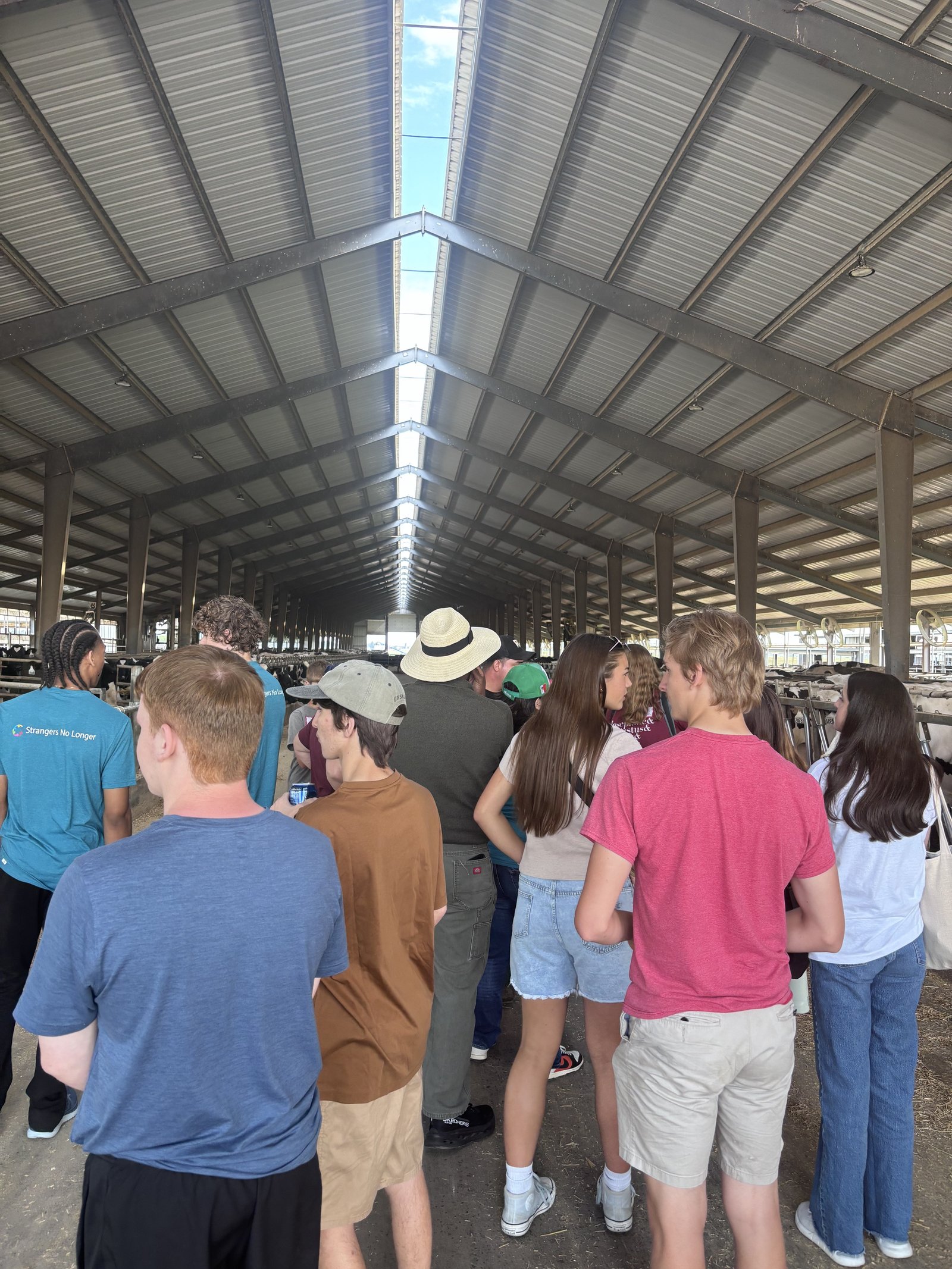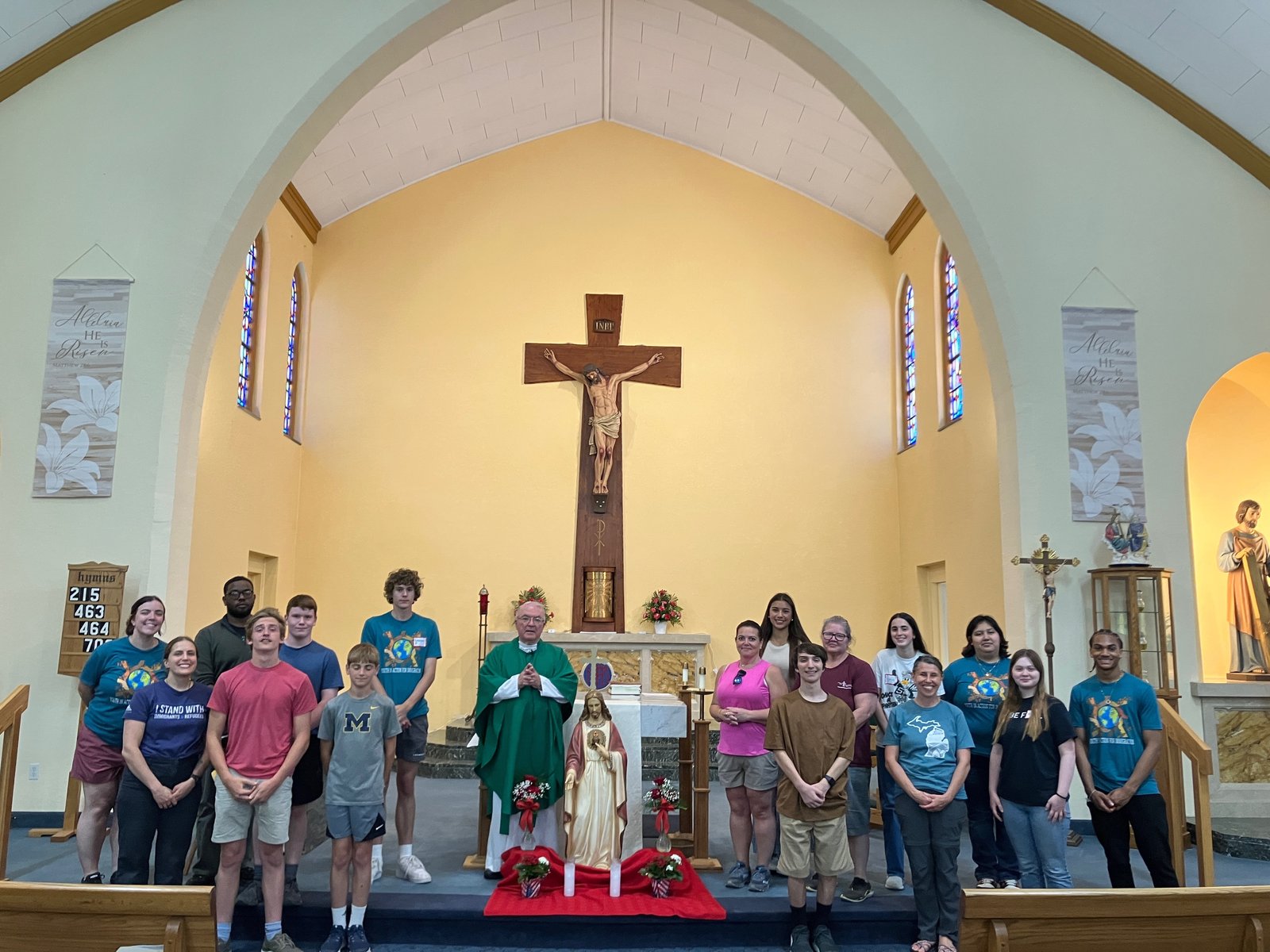Youth from area Catholic, non-Catholic schools spend time in Michigan's Thumb learning about conditions for farm workers
SEBEWING — Around a dozen high school students from Metro Detroit and beyond took part in an immigration immersion experience in Michigan’s Thumb region in June, learning about the challenges migrant workers face in the state’s agricultural economy.
The immigration immersion trip was sponsored by Strangers No Longer, a Detroit-based Catholic immigration support group that seeks to accompany immigrants, advocate for immigration reform and promote a vision of the Church as a welcoming community for immigrants.
The summer immersion trip allowed students to get a “boots-on-the-ground” look at the living conditions of migrant workers, said Hannah Coley, a theology teacher at University of Detroit Jesuit High School.
“This was a chance for students to see how we can help communities that we are relatively unfamiliar with,” Coley told Detroit Catholic. “We spent a good amount of time in Sebewaing in the Thumb of Michigan, connecting our students to the local parish.”
Ten students and their chaperones stayed June 15-18 at the rectory of Our Lady Consolata Parish in Sebewaing in the Diocese of Saginaw, a parish that has built connections with migrant workers in the area who work at the various dairy farms that populate Huron County.

George Plymale, a rising junior at U of D Jesuit, was a student in Coley's theology class last year, when he learned about the connection between Catholic social justice and the rights of workers. Plymale wanted to use the immersion experience to learn more about immigration issues.
“It was what Pope Francis called us to do: seek out those on the margins and help them," Plymale said. "I never knew this was an intrinsic part of our Catholic faith, but the more I learned, the more I was motivated to do something to help.”
During the immersion experience, Plymale joined students from Cristo Rey High School in Detroit, Notre Dame Preparatory in Pontiac, Christ the Good Shepherd Youth Group in Lincoln Park, members of the Boyne Valley Catholic Community in the Diocese of Gaylord and Catholic high school students from the Diocese of Saginaw in learning about the lives of migrant workers, their families, the people who run the farms and restaurants that employ workers and the faith leaders who provide spiritual care for workers.
“Most people speak of migrant workers as being undocumented, but the ones we spoke to came on H1N1 visas, and they’re just over here to work,” Plymale said. “But the problem is that they are at the mercy of their employers. It’s a system that needs to be changed and refined to protect people who provide our economy and country with these services. We heard testimonies from the way a company mistreated one of their workers and how the worker had no recourse to go to for justice.”
As an educator, Coley said she enjoys seeing students leave their comfort zones to learn real-life lessons outside the classroom.
“It really was a powerful experience for students as well as educators to witness Stranger No Longer as an organization initiating new relationships in real time," Coley said. "This immersion trip was so focused on students’ experience, igniting their faith in a real, practical way.
"This was a chance for students from more urban areas to learn about the issues of immigration from a more rural setting," Coley added. "We got to see students outside their usual comfort zone experience how others live in an environment in which they’re not familiar."
Plymale said he and other U of D Jesuit students have participated in immigration support rallies in Clark Park in southwest Detroit and have worked with immigration rights groups across the city, but what he saw in Sebewaing gave him a new perspective.

“The Thumb is this wide, spread-out rural area, and it’s harder for migrant workers to find support, whether it’s Mass in Spanish or having to go to food banks and things like that," Plymale said. "There is just not a lot of the Hispanic community to provide that support, and with so many workers who don’t speak English, they are often isolated in the community.”
Students stayed in the parish rectory at Our Lady of Consolata Parish, where they prayed, ate with and listened to migrant workers' stories.
“Students on this immersion trip had the opportunity to see what the preferential option for the poor and vulnerable actually looks like in a very practical way,” Coley said.
Olivia Pineda-Andersen, a rising junior at Boyne Falls High School and a member of the Boyne Valley Catholic Community, said the immersion trip allowed students to put names and faces to the people behind the issues.
She recalled participating with Strangers No Longer last year on an immersion trip to a vineyard around the Traverse City area.

“This vineyard in the front was gorgeous, with all these amazing facilities and such a welcoming entrance,” Pineda-Andersen said. “We then drove five miles down the road to the back of the property, where there was this poor little trailer, and it was so upsetting because all of the people who ran this vineyard and who worked to make it gorgeous, they were crammed into this one small trailer.
“They cooked us such a nice meal, and they showed us around the facilities that they had in the very back of the property where they were hidden from the public,” Pineda-Andersen continued. “It was so upsetting to see, because they thought they were so lucky to have this trailer and have what they had, because it was so much better than what their friends had been given when they worked at other vineyards. It put so much pain in my heart to see.”
By contrast, this year the group visited a dairy farm in Pigeon, which Pineda-Andersen described as a “night and day” difference from what she witnessed near Traverse City.
“Their workers were treated very well; they had shared houses, but each family had a substantial amount of room and were comfortable living there,” Pineda-Andersen said. “(The farm) provided all of their migrant employees with vehicles so they could get around, and gave them information cards about their rights in case they were pulled over. Not many of them could speak English, so the cards were in Spanish and English and explained who they were, their documentation status and where they worked.”
But still, there were areas of concern, Pineda-Anderson said, including injuries and medical bills from working in the fields.

The experience from this year’s immersion trip also inspired students with concrete ways to advocate for migrant workers in the state, said Plymale, who is now the co-advocacy lead for the Strangers No Longer group at University of Detroit Jesuit.
“We are looking to advocate to our state representatives and senators in passing a bill to streamline protections for migrant workers when they get hurt on the job,” Plymale said. “We also want them to be able to safely drive around the state. These workers are doing important jobs for our economy, and we want them to be able to work safely."
During the immersion trip, students would end every day in prayer at Our Lady of Consolata, discussing what they'd seen, heard and experienced, Coley said.
“I had a conversation with a student on the last day of the trip,” Coley said. “As were talking, we were discussing the Eucharistic prayer. We speak about 'this bread, the work of human hands.' How powerful that when we receive Christ in the Eucharist, we receive him through the means of labor, through the means of the earth, through the means of being leaven for one another and lifting each other up.”
Copy Permalink
Immigration and refugees












